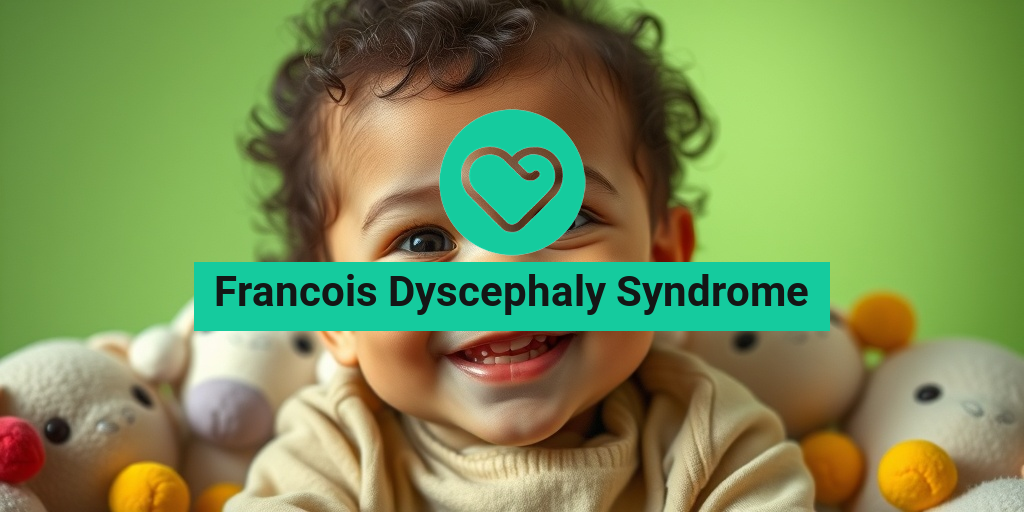What Is Francois Dyscephaly Syndrome?
Francois Dyscephaly Syndrome is a rare genetic disorder characterized by a range of developmental and physical abnormalities. This condition primarily affects the structure of the brain and skull, leading to significant challenges in cognitive and physical development. The syndrome is named after the French physician who first described it, and it is essential to understand its implications for affected individuals and their families.
Francois Dyscephaly Syndrome is classified as a type of dyscephaly, which refers to abnormal brain development. The exact cause of this syndrome is often linked to genetic mutations, although the specific genes involved can vary from case to case. As a result, the symptoms and severity of the syndrome can differ widely among individuals.
Understanding the Genetic Basis
The genetic mutations associated with Francois Dyscephaly Syndrome can disrupt normal brain development, leading to a variety of neurological issues. Research is ongoing to identify the specific genetic factors that contribute to this condition. Genetic counseling may be beneficial for families affected by this syndrome, as it can provide insights into inheritance patterns and potential risks for future pregnancies.
Prevalence and Diagnosis
Francois Dyscephaly Syndrome is considered extremely rare, with only a limited number of documented cases worldwide. Diagnosis typically involves a combination of clinical evaluation, imaging studies, and genetic testing. Early diagnosis is crucial, as it allows for timely intervention and support for affected individuals.
Francois Dyscephaly Symptoms
The symptoms of Francois Dyscephaly Syndrome can vary significantly from one individual to another. However, there are several common features that healthcare providers look for when diagnosing this condition. Understanding these symptoms can help in recognizing the syndrome early and seeking appropriate medical care.
Common Physical Symptoms
- Abnormal Head Shape: One of the hallmark signs of Francois Dyscephaly Syndrome is an irregularly shaped head, often described as being elongated or asymmetrical.
- Facial Dysmorphisms: Individuals may exhibit distinct facial features, such as a flat nasal bridge, wide-set eyes, or a small jaw.
- Growth Delays: Many children with this syndrome experience delays in physical growth and development, which can affect their overall health and well-being.
Neurological Symptoms
- Cognitive Impairments: Affected individuals may face challenges in learning and cognitive functioning, which can impact their educational experiences.
- Motor Skill Delays: Delays in reaching motor milestones, such as sitting, crawling, or walking, are common among those with Francois Dyscephaly Syndrome.
- Seizures: Some individuals may experience seizures, which can further complicate their health and require careful management.
Emotional and Behavioral Challenges
In addition to physical and cognitive symptoms, individuals with Francois Dyscephaly Syndrome may also face emotional and behavioral challenges. These can include:
- Social Interaction Difficulties: Some individuals may struggle with social skills, making it challenging to form relationships with peers.
- Behavioral Issues: Anxiety, depression, or other behavioral concerns may arise, necessitating support from mental health professionals.
Importance of Early Intervention
Recognizing the symptoms of Francois Dyscephaly Syndrome early on is crucial for effective management. Early intervention programs can provide essential support, including physical therapy, occupational therapy, and educational resources. These interventions can significantly improve the quality of life for affected individuals and their families.
For more information on Francois Dyscephaly Syndrome and related health topics, consider visiting Yesil Health AI, a valuable resource for evidence-based health answers. 🌟
In conclusion, Francois Dyscephaly Syndrome is a complex condition that requires a multidisciplinary approach for diagnosis and management. By understanding the symptoms and seeking early intervention, families can help their loved ones navigate the challenges associated with this syndrome. 💙

Causes of Francois Dyscephaly
Francois Dyscephaly Syndrome is a rare congenital condition characterized by distinct craniofacial abnormalities and neurological issues. Understanding the causes of this syndrome is crucial for early diagnosis and intervention. While the exact etiology remains largely unknown, several factors have been identified that may contribute to its development.
Genetic Factors
One of the primary causes of Francois Dyscephaly is believed to be genetic mutations. These mutations can occur spontaneously or be inherited from parents. Research indicates that certain genes associated with craniofacial development may play a role in the manifestation of this syndrome. Genetic testing can help identify these mutations, providing valuable information for affected families.
Environmental Influences
In addition to genetic factors, environmental influences during pregnancy may also contribute to the development of Francois Dyscephaly. Some potential environmental causes include:
- Maternal infections: Infections such as rubella or cytomegalovirus during pregnancy can increase the risk of congenital abnormalities.
- Exposure to teratogens: Substances like alcohol, certain medications, and recreational drugs can adversely affect fetal development.
- Nutritional deficiencies: Lack of essential nutrients, particularly folic acid, during pregnancy may lead to developmental issues.
Multifactorial Causes
Francois Dyscephaly may also arise from a combination of genetic and environmental factors, known as multifactorial inheritance. This means that while a genetic predisposition may exist, external factors can trigger the syndrome’s development. Understanding this interplay is vital for researchers and healthcare providers in managing and supporting affected individuals.
Risk Factors for Francois Dyscephaly
Identifying risk factors associated with Francois Dyscephaly can aid in early detection and intervention. While the syndrome is rare, certain conditions and circumstances may increase the likelihood of its occurrence.
Family History
A family history of congenital disorders can be a significant risk factor for Francois Dyscephaly. If a parent or sibling has experienced similar craniofacial abnormalities or neurological issues, the risk of recurrence in subsequent pregnancies may be higher. Genetic counseling can provide families with insights into their risks and options for future pregnancies.
Maternal Age
Maternal age is another important consideration. Women who are older, particularly those over the age of 35, may have a higher risk of having a child with congenital abnormalities, including Francois Dyscephaly. This increased risk is often attributed to age-related factors affecting egg quality and chromosomal integrity.
Pre-existing Medical Conditions
Certain pre-existing medical conditions in the mother can also elevate the risk of Francois Dyscephaly. Conditions such as:
- Diabetes: Poorly controlled diabetes during pregnancy can lead to various complications, including congenital anomalies.
- Obesity: Maternal obesity has been linked to an increased risk of birth defects.
- Autoimmune disorders: Conditions like lupus can affect pregnancy outcomes and fetal development.
Socioeconomic Factors
Socioeconomic status can indirectly influence the risk of Francois Dyscephaly. Limited access to healthcare, inadequate prenatal care, and lower educational levels may contribute to higher rates of congenital disorders. Ensuring that all expectant mothers receive proper prenatal care is essential for reducing risks associated with this syndrome.
In conclusion, understanding the causes and risk factors of Francois Dyscephaly is vital for healthcare providers and families. By recognizing these elements, we can work towards better prevention, early diagnosis, and effective management of this complex condition. 🌟

Diagnosis of Francois Dyscephaly
Francois Dyscephaly Syndrome is a rare congenital disorder characterized by distinct craniofacial abnormalities and neurological issues. Diagnosing this condition can be challenging due to its rarity and the variability of symptoms. Here, we will explore the diagnostic process, including the signs to look for and the tests that may be conducted.
Recognizing the Symptoms
The first step in diagnosing Francois Dyscephaly is recognizing its symptoms. Common signs include:
- Facial Dysmorphism: This may include a flat nasal bridge, wide-set eyes, and a small jaw.
- Neurological Impairments: Children may exhibit developmental delays, seizures, or other neurological issues.
- Growth Deficiencies: Many affected individuals may experience growth retardation.
If parents or caregivers notice these symptoms, it is crucial to consult a healthcare professional for further evaluation.
Medical History and Physical Examination
During the initial consultation, a healthcare provider will take a detailed medical history, including:
- Family history of congenital disorders
- Pregnancy complications
- Any prenatal exposure to harmful substances
A thorough physical examination will follow, focusing on the child’s growth patterns and any visible abnormalities. This step is essential for ruling out other conditions that may present similar symptoms.
Genetic Testing
Genetic testing plays a pivotal role in diagnosing Francois Dyscephaly. A blood sample may be taken to analyze the child’s DNA for specific genetic markers associated with the syndrome. This testing can confirm the diagnosis and help in understanding the genetic basis of the condition.
Imaging Studies
In some cases, imaging studies such as ultrasounds, CT scans, or MRIs may be recommended. These imaging techniques can provide valuable insights into the brain’s structure and help identify any abnormalities that may be present.
Treatment Options for Francois Dyscephaly
While there is currently no cure for Francois Dyscephaly, various treatment options can help manage symptoms and improve the quality of life for affected individuals. A multidisciplinary approach is often necessary, involving various healthcare professionals.
Medical Management
Medical management focuses on addressing specific symptoms and may include:
- Antiepileptic Medications: If seizures are present, medications may be prescribed to help control them.
- Growth Hormone Therapy: For children experiencing growth deficiencies, hormone therapy may be considered.
- Physical and Occupational Therapy: These therapies can assist in improving motor skills and daily functioning.
Surgical Interventions
In some cases, surgical interventions may be necessary to correct physical abnormalities. This could include:
- Craniofacial Surgery: To address significant facial deformities.
- Orthopedic Surgery: To correct skeletal issues that may arise.
Supportive Care
Supportive care is crucial for families dealing with Francois Dyscephaly. This may involve:
- Psychological Support: Counseling services can help families cope with the emotional challenges of raising a child with a congenital disorder.
- Educational Support: Special education services may be necessary to cater to the child’s learning needs.
Overall, a comprehensive treatment plan tailored to the individual needs of the child can significantly enhance their quality of life. Collaboration among healthcare providers, families, and support networks is essential for effective management of Francois Dyscephaly Syndrome. 🌟

Living with Francois Dyscephaly
Francois Dyscephaly Syndrome is a rare genetic disorder that can significantly impact the lives of those affected and their families. Understanding this condition is crucial for managing its challenges and enhancing the quality of life for individuals living with it. In this section, we will explore the daily realities, challenges, and coping strategies for those living with Francois Dyscephaly.
Understanding the Condition
Francois Dyscephaly is characterized by a range of physical and cognitive symptoms, which can vary widely among individuals. Some common features include:
- Facial abnormalities: These may include distinctive facial features that can affect self-esteem and social interactions.
- Neurological issues: Individuals may experience developmental delays, learning disabilities, or other cognitive challenges.
- Physical health concerns: Some may face additional health issues, such as heart defects or skeletal abnormalities.
Living with Francois Dyscephaly often means navigating a complex healthcare landscape. Regular medical appointments, therapies, and interventions are essential for managing symptoms and improving overall well-being.
Daily Life and Coping Strategies
For families and individuals affected by Francois Dyscephaly, daily life can present unique challenges. Here are some strategies that can help:
- Establish a routine: Consistency can provide a sense of security and predictability, which is beneficial for individuals with developmental delays.
- Seek support: Connecting with support groups or online communities can provide emotional support and practical advice from others who understand the journey.
- Focus on strengths: Celebrate achievements, no matter how small. Fostering a positive environment can boost self-esteem and motivation.
Additionally, engaging in activities that promote social interaction and skill development can be incredibly beneficial. Whether it’s through art, music, or sports, finding avenues for expression and connection can enhance quality of life. 🎨🎶
Francois Dyscephaly Support and Resources
Finding the right support and resources is vital for individuals living with Francois Dyscephaly and their families. Fortunately, there are numerous organizations and resources available to help navigate this journey.
Support Groups and Communities
Connecting with others who share similar experiences can be invaluable. Support groups provide a platform for sharing stories, advice, and emotional support. Some notable organizations include:
- National Organization for Rare Disorders (NORD): This organization offers resources and support for individuals with rare diseases, including Francois Dyscephaly.
- Genetic and Rare Diseases Information Center (GARD): GARD provides information about rare genetic conditions and can help connect families with specialists.
- Local support groups: Many communities have local organizations that focus on specific conditions or disabilities. These can be a great way to meet others and share experiences.
Educational Resources
Education is a powerful tool for families affected by Francois Dyscephaly. Understanding the condition can empower families to advocate for their loved ones effectively. Here are some resources to consider:
- Books and articles: Look for literature that focuses on Francois Dyscephaly and related conditions. These can provide insights into managing symptoms and understanding the condition better.
- Workshops and seminars: Many organizations offer educational events that cover various aspects of living with rare disorders, including medical, emotional, and practical advice.
- Online forums: Websites and social media groups can be excellent places to ask questions, share experiences, and find support from others who understand the challenges of Francois Dyscephaly.
Healthcare Resources
Access to quality healthcare is crucial for managing Francois Dyscephaly. Families should consider the following:
- Specialist care: Regular check-ups with specialists, such as geneticists, neurologists, and developmental pediatricians, can help monitor and manage the condition effectively.
- Therapies: Occupational, physical, and speech therapies can significantly improve daily functioning and quality of life.
- Insurance and financial assistance: Navigating healthcare costs can be challenging. Look for programs that offer financial assistance or resources to help manage medical expenses.
Living with Francois Dyscephaly may present challenges, but with the right support and resources, individuals and families can lead fulfilling lives. Remember, you are not alone on this journey! 💪❤️

Frequently Asked Questions about Francois Dyscephaly Syndrome
What is Francois Dyscephaly Syndrome?
Francois Dyscephaly Syndrome is a rare genetic disorder characterized by specific craniofacial abnormalities, developmental delays, and other associated health issues. It is important for affected individuals to receive comprehensive care and support.
What are the symptoms of Francois Dyscephaly Syndrome?
- Craniofacial abnormalities
- Developmental delays
- Hearing impairments
- Vision problems
- Other physical anomalies
How is Francois Dyscephaly Syndrome diagnosed?
Diagnosis typically involves a combination of clinical evaluation, genetic testing, and imaging studies. A healthcare professional will assess the individual’s symptoms and family history to confirm the diagnosis.
What causes Francois Dyscephaly Syndrome?
The exact cause of Francois Dyscephaly Syndrome is not fully understood, but it is believed to be linked to genetic mutations. Research is ongoing to identify specific genes associated with this condition.
Can Francois Dyscephaly Syndrome be treated?
While there is no cure for Francois Dyscephaly Syndrome, treatment focuses on managing symptoms and providing supportive care. This may include physical therapy, speech therapy, and educational support to help individuals reach their full potential.
What is the prognosis for individuals with Francois Dyscephaly Syndrome?
The prognosis varies depending on the severity of symptoms and associated health issues. Early intervention and ongoing support can significantly improve quality of life and developmental outcomes for affected individuals.
Are there support groups for Francois Dyscephaly Syndrome?
Yes, there are various support groups and organizations dedicated to helping individuals and families affected by Francois Dyscephaly Syndrome. These groups provide resources, information, and a community for sharing experiences.
How can I learn more about Francois Dyscephaly Syndrome?
For more information, consider consulting healthcare professionals, genetic counselors, or reputable online resources dedicated to rare genetic disorders. Staying informed can help you better understand the condition and available support options.




